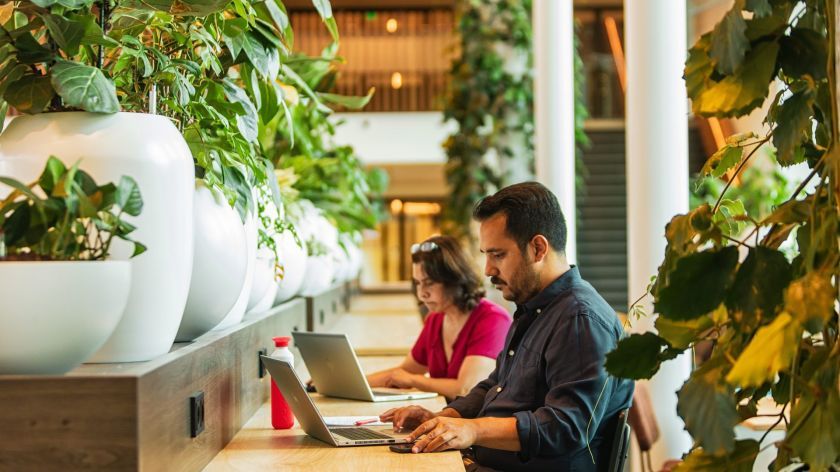University employees value own workspace, resistance to open-plan offices is high
-
 Photo: Dick van Aalst
Photo: Dick van Aalst
Employees of Radboud University prefer to have their own workspace on campus, shared with colleagues if need be. This is according to the results of a survey conducted by the Works Council. 'Surely the Executive Board does not want to go against the wishes of the employees?'
If it is up to the Executive Board, many employees of Radboud University will no longer have a fixed workspace in the future. The Campus Plan, in which the board presents its vision of the campus in 2030, states, among other things, that “personal workspaces” will change to a “working environment with shared workspaces and facilities as the norm”.
53 percent of the employees do not find this a good idea. This is according to a survey sent out by the Works Council to all university employees.
New building
37.5 percent of all employees filled out the survey. Member of the Works Council Peter van der Heiden, who created the survey together with Arnoud Lagendijk, is happy with 1956 respondents. ‘Apparently it is a hot topic’, he says.
That is even more so the case in the Erasmus building. There, two-thirds of all employees filled out the survey. The announcement of a new building for humanities, which should be finished in 2027, most likely plays a role. ‘Because employees in the Erasmus building will be the first to move to the new building, they might fear bearing the brunt of the plans’, says Van der Heiden.
Knapsack
Still, Van der Heiden thinks employees have filled out the survey with some nuance. ‘It was not a strange thing to think that all employees would claim their own office, but that is not the case’, he says. ‘They help to think about the problem, especially the low occupancy rate in some buildings.’ A large majority of the employees (71 percent) is in favour of optimising room occupancy, for example.
At the same time, says Van der Heiden, the idea of people not having their own office –shared or otherwise – is clearly rejected. ‘I totally understand that, because you do not want to trek around campus with your little knapsack going from workspace to workspace. And a group feeling might also play a role: wanting to sit together with your department.’
No open-plan offices
So what should the workspace look like? Across the university, employees prefer offices shared with two to four people (46 percent) with each having their own fixed place. Employees at the Erasmus building have a strong preference for their own personal office.
Only the largest group of employees at the Radboud Teachers Academy (33 percent) – the only group in the Erasmus building that has experience with this – opts for flexible workspaces in an open-plan office. Other employees do not like open-plan offices, whether there is a fixed workspace (69 percent are against), or a flexible one (81 percent are against).
Unsolicited advice
According to Van der Heiden, in the Campus Plan, the Executive Board took the housing problem as the main focus and not the wishes of employees. ‘They took far too corporate an approach. They would have done better to map out the wishes of employees themselves first: after all, they perform the tasks and the workspaces should correspond to those tasks, not the other way around.’
During the next Joint Meeting, on Monday 20 March, the Works Council intends to discuss the results of the survey with the Executive Board. ‘We’re pretty much giving unsolicited advice’, says Van der Heiden. ‘But it seems to me that the board is reluctant to go against the majority of staff. For that, workspaces are too decisive for how eager and good people are at their jobs.’
Translated by Jan Scholten.



